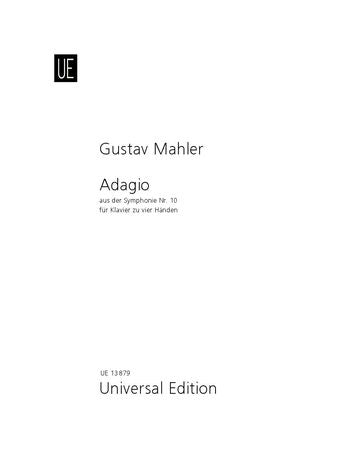
UNIVERSAL EDS/WIENER/PRESSER - 864872
Mahler Adagio from the Symphony No. 10 for piano 4 hands
Composer: Gustav Mahler
Publisher: Universal Edition
Instrumentation: Piano Four Hands
Ensemble: Two Pianos, Four Hands
Mahler Adagio from the Symphony No. 10 for piano 4 hands
Juilliard Store
144 West 66th Street
New York NY 10023
United States
Choose options
Mahler Adagio from the Symphony No. 10 for piano 4 hands
Juilliard Store
144 West 66th Street
New York NY 10023
United States
Mahler Adagio from the Symphony No. 10 for piano 4 hands
Juilliard Store
144 West 66th Street
New York NY 10023
United States
Begun between July and September 1910 in Toblach, Mahler’s Symphony No. 10 remained a fragment; however, the surviving manuscript provides indications of the composition’s form and content. The autograph sketch lays out all the symphony’s essentials and all five movements are present in the short score.
The first movement, an adagio, and the third, called Purgatorio, were premiered on 12 October 1924 by Franz Schalk at the Vienna State Opera; Ernst Krenek had prepared and completed the musical materials. The full score of those two movements was not published until 1951.
This basic source material provides a clear view of the symphony’s fundamental structure; in its style, the work continues that of the 9th and, in some phrases, embarks on uncharted territory beyond that. This is especially true of the Adagio, enriched by its harmony, with its advanced modulations and chromatics; note bars 203-208, where a garish, dissonant chord of nine pitches builds up (repeated like a quote in the finale). The unmistakeable expressive power in this passage corresponds to rhythmic innovations which anticipate Stravinsky’s “emancipation of rhythm.”
Overstepping the traditional limits of emotional radicalism, this Adagio is certainly the summit of Mahler’s late work – more so than the Abschied movement of Das Lied von der Erde and the finale of his 9gh symphony. It is a written-out deliverance, a farewell. (To complete the picture, we may note the marginal remarks on his autograph – some of the most personal he ever left – and that his marriage to Alma was disintegrating at the time).
